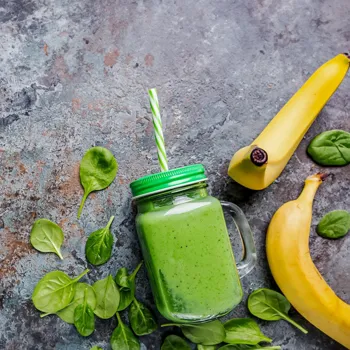Unlock the secrets to optimal health with these 10 essential nutrients! Dive in for a journey to wellness
In the hustle and bustle of daily life, it's easy to overlook one of the most crucial aspects of our
well-being: nutrition. We often grab quick bites, processed foods, or skip meals altogether, leaving our bodies deprived of the vital nutrients they need to function optimally.
A balanced diet, rich in essential nutrients, is the cornerstone of good health, providing the building blocks for energy, immunity, and overall wellness. Let us dive into ten essential nutrients that can make a significant difference in your health journey.
Vitamin A: The Visionary Protector
Vitamin A is not just about eyesight; it's a versatile nutrient that plays a critical role in numerous bodily functions. It's a fat-soluble vitamin, meaning it's absorbed with fats in the diet and stored in the body.
Among its most well-known benefits is its contribution to healthy vision, especially in low light. Vitamin A helps form rhodopsin, a pigment in the retina that allows us to see at night. Also, vitamin A keeps our skin and lining of our nose healthy and is important for growth and immunity.
Include foods such as carrots, sweet potatoes, spinach, and mangoes in your diet to boost your Vitamin A intake. These colourful fruits and vegetables are packed with beta-carotene, which the body converts into Vitamin A.
By ensuring an adequate intake of vitamin A, you're investing in long-term vision health and bolstering your body's defence mechanisms.
B Vitamins: The Energy Enhancers
B vitamins are a group of eight essential nutrients that work together to convert food into energy. Each B vitamin has a unique role, but they all contribute to the overall health of the nervous system, brain function, and cell metabolism.
B12 helps form red blood cells and maintain a healthy nerve system, while B6 is crucial for brain development and function. Folate, or B9, is essential for cell growth and division. Foods such as whole grains, lentils, chickpeas, and leafy green vegetables are excellent sources of B vitamins.
A deficiency in B vitamins can lead to fatigue, weakness, and neurological problems, so make sure that your plate is colourful with B-vitamin filled items.
Including a variety of these foods in your daily diet ensures you receive a comprehensive spectrum of B vitamins to keep you energized and your mind sharp.
Vitamin C: The Immunity Booster
Vitamin C is a powerful antioxidant and a major player in supporting the immune system. This water-soluble vitamin is essential for protecting cells from damage caused by free radicals, unstable molecules that can contribute to aging and various health problems.

Vitamin C plays a vital role in collagen production, a protein that supports healthy skin, blood vessels, bones, and cartilage. It also helps the body absorb iron. Good food sources are citrus fruits (oranges, lemons and limes), strawberries, capsicum, tomatoes and broccoli.
Regular consumption of vitamin C-rich foods can significantly strengthen your immune defences, making you more resistant to infections and illnesses. It's also a great addition to your diet for that glowing, healthy skin you've always wanted.
Vitamin D: The Sunshine Vitamin
Vitamin D, often called the "sunshine vitamin," is vital for bone health and calcium absorption. Our bodies produce vitamin D when our skin is exposed to sunlight, but many people don't get enough, especially during the winter months/ in colder regions/ cloudy days.
Apart from sunlight, some foods that are high in Vitamin D are fortified milk and cereals, but they are not always enough. Vitamin D supports the immune system and reduces inflammation. A deficiency in vitamin D can lead to bone weakness, fatigue, and decreased immunity.
Spending some time outdoors and including vitamin D-rich foods/supplements can help ensure you get adequate levels of this essential nutrient. If you live in a place where sun exposure is limited, consider consulting a doctor to check your vitamin D levels and discuss supplementation if needed.
Vitamin E: The Antioxidant Protector
Vitamin E is a fat-soluble nutrient that acts as a potent antioxidant, protecting cells from damage caused by free radicals. This vitamin is essential for maintaining healthy skin and eyes, boosting the immune system, and improving overall cellular health.
Vitamin E also helps the body use vitamin K. Foods like almonds, sunflower seeds, spinach, and avocados are good sources of vitamin E. Including these foods in your diet will help protect your body from oxidative stress and support your overall well-being.
Eating food rich in vitamin E ensures that your cells are well-protected against damage, which is crucial for long-term health and vitality.
Calcium: The Bone Builder
Calcium is well known for its major role in bone and teeth health. This mineral is not only essential for maintaining strong bones; it also supports nerve function, muscle contraction, and blood clotting.

The body constantly uses calcium, so it's very important to make sure it gets enough into the body to keep bones strong. Include dairy (milk, yoghurt and cheese), seeds, leafy greens, and fortified plant-based milk in your diet to boost your calcium intake.
It is important to pair calcium with vitamin D, which helps the body absorb calcium efficiently. Getting sufficient calcium throughout your life can help prevent osteoporosis, a condition characterized by weak and brittle bones.
Iron: The Oxygen Transporter
Iron is a critical component of haemoglobin, the protein in red blood cells that carries oxygen throughout the body. It is essential for maintaining energy levels, especially for growing children/ adolescents, menstruating women and anyone involved in rigorous physical activity.
Iron also plays a crucial role in brain development and immune function. Food sources include pulses, spinach, beetroot, and fortified cereals. Not consuming enough iron causes iron deficiency anemia, which leads to fatigue, weakness, and impaired cognitive function.
Always consult a doctor if you feel you are deficient in iron. Pairing these iron-rich foods with vitamin C-rich foods can enhance iron absorption and maximize its benefits.
Potassium: The Blood Pressure Regulator
Potassium is an essential mineral that helps regulate blood pressure, maintain fluid balance, and support nerve and muscle function. It works in harmony with sodium to control the balance of fluids in the body. A deficiency in potassium can lead to high blood pressure, muscle cramps, and weakness.

Including foods like bananas, sweet potatoes, spinach, and beans in your diet can help ensure you get enough potassium. These foods are nutrient-dense and offer various health benefits beyond their potassium content.
Regular consumption of potassium-rich foods supports healthy blood pressure levels and helps keep your heart and muscles functioning properly.
Magnesium: The Muscle Relaxer
Magnesium is involved in over 300 enzymatic reactions in the body, supporting muscle and nerve function, regulating blood sugar levels, and maintaining healthy blood pressure. It also plays a role in energy production and bone health.
Good sources of magnesium are leafy green vegetables, nuts, seeds, and whole grains. Magnesium deficiency can result in muscle cramps, fatigue, and increased stress levels.
Incorporating magnesium-rich foods into your daily diet is a simple yet effective way to support your overall health and keep your muscles relaxed and functioning at their best.
Omega-3 Fatty Acids: The Brain Booster
Omega-3 fatty acids are essential fats that the body cannot produce on its own. These fats are crucial for brain health, reducing inflammation, and supporting heart health. There are three main types of omega-3 fatty acids such as ALA, EPA & DHA.
Incorporating foods like flaxseeds, chia seeds, and walnuts can help you get your daily dose of omega-3s. These fatty acids support cognitive function, improve mood, and protect against heart disease.
Adding these foods to your diet is a great way to boost your brainpower and promote a healthier heart.
Incorporating this variety of nutrients into your daily diet through a balanced and varied intake will contribute to maintaining excellent health and overall well-being.
However, always consult a doctor before making any important modifications to diet or before starting taking supplements. They can offer personalised guidance based on your particular requirements and health state.
AI Generated Content. Glance/InMobi shall have no liability for the content












